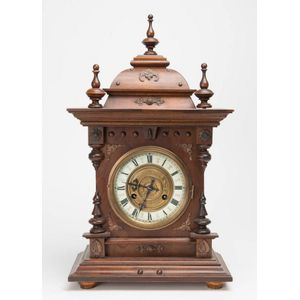Victorian Architectural Mantel Clock
You must be a subscriber, and be logged in to view price and dealer details.
Subscribe Now to view actual auction price for this item
When you subscribe, you have the option of setting the currency in which to display prices to $Au, $US, $NZ or Stg.
- Victorian Period - The Victorian period of furniture and decorative arts design covers the reign of Queen Victoria from 1837 to 1901. There was not one dominant style of furniture in the Victorian period. Designers used and modified many historical styles such as Gothic, Tudor, Elizabethan, English Rococo, Neoclassical and others, although use of some styles, such as English Rococo and Gothic tended to dominate the furniture manufacture of the period.
The Victorian period was preceded by the Regency and William IV periods, and followed by the Edwardian period, named for Edward VII (1841 ? 1910) who was King of the United Kingdom and the British Dominions and Emperor of India for the brief period from 1901 until his death in 1910. - Bezel - On a clock or watch, the bezel is the metal frame into which the watch or clock glass is fitted. In clocks, the bezel may include a hinge and a flange, in effect a door to the face of the clock. In jewellery the bezel is a band of metal with a projecting lip that holds the gemstone in its setting.
- Finial - An architectural decoration, found on the upper parts of of an object. On furniture they are usually found on pediments, canopies and shelf supports. On smaller ceramic or silver items, such as spoons, they may decorate the top of the item itself, or the lid or cover where they provide a useful handle for removal.
Finials have a variety of shapes and forms. They may be urn-shaped, baluster shaped round or spiral, but usually taper into an upper point. Many real life shapes may also be used as finials, such as pineapples, berries, pinecones, buds, lotus and acorns. Sometimes animals such as a lion are depicted, or fish and dolphins. - Circa - A Latin term meaning 'about', often used in the antique trade to give an approximate date for the piece, usually considered to be five years on either side of the circa year. Thus, circa 1900 means the piece was made about 1900, probably between 1895 and 1905. The expression is sometimes abbreviated to c.1900.
This item has been included into following indexes:
Visually similar items

German walnut cased antique mantle clock, late 19th century. 50 cm

A walnut cased mantle clock, later 19th century, crossed arrow mark for Hac, the Hamburg American clock Co, the clock with a white metal and engraved gilt dial with Roman numerals and pierced foliate spandrels surmounted by a mascaron and set within an arc

A French Empire gilt bronze mantel clock with strike movement on one bell, the enamelled dial with Roman numeral within flared case on bun feet. 40 cm high

German timber turned mantle clock circa 1900s, with keys & a pendulum. Height 44.5 cm
